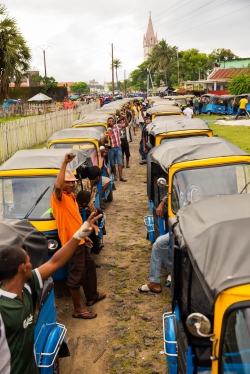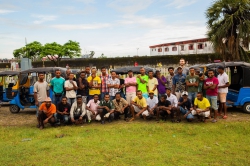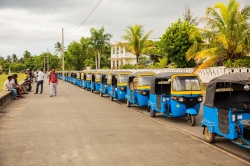Social Innovation in a Speedy Way
PROVO, Utah – Apr 24, 2019 – While the hustle and bustle of big cities in America are characterized by taxis and Uber and Lyft vehicles, Madagascar’s ubiquitous mode of travel looks very different. In Madagascar, three-wheeled auto-rickshaws called tuk tuks (pronounced TUKE TUKE) zoom from place to place picking up and dropping off people in a taxi-like fashion—but there the drivers operate within a very different system: they perpetually rent the vehicles from wealthier tuk tuk renters. With the goal of helping drivers get out of the renting cycle, and hopefully the poverty trap, a BYU Marriott student and a team of BYU graduates, with the help of the BYU Marriott Ballard Center’s Social Venture Academy (SVA), founded Speedy Tuk Tuk, a rent-to-own company.
“With the current system of ‘ownership,’ drivers are on a forever-rental system,” states Jason Koncurat, a BYU Marriott pre-management major from Ellicott City, Maryland. The current system involves taxi drivers renting a tuk tuk for years on end. Because of the high cost of rent, drivers make only enough money to live day-to-day, much less buy their own tuk tuk.
All three team members, including Hayden Roney, Josh Steele, and Koncurat, served missions for The Church of Jesus Christ of Latter-day Saints in Madagascar. Roney and Steele, both located in Provo, were working together on another company they owned when they met Koncurat through mutual connections. Koncurat, as a current student at BYU Marriott, was able to utilize the Ballard Center’s SVA as a resource in the development of Speedy Tuk Tuk.
Roney, a BYU Marriott graduate in marketing, and Steele, a BYU graduate in food science currently studying business management at Western Governors University, first notice the “forever-renting” problem when they returned to Madagascar to work on a separate business venture. The two of them were riding on a tuk tuk when the driver began telling the Americans about the reality he had experienced every day for the past five years. He told them that every day he rented a tuk tuk to taxi riders around the city, and at the end of the day he’d make about $13. After he paid the renting fee—which ends up being about $10—he’d take home the $3 that was left.
Roney and Steele did some fast math and quickly realized that the driver had spent nearly $18,000 renting from another person. Shocked at the substantial amount of money the driver had put down on rent, and how little he actually received from his labor, Roney and Steele recognized that the inability to save money to purchase a tuk tuk was a problem. They asked around to see if other drivers had a similar plight and found that this was the experience of most drivers.
“Speedy Tuk Tuk has two main goals: helping drivers own their tuk tuks and helping them out of poverty,” says Koncurat. Social innovation is at the core of the Speedy Tuk Tuk model because the company gives drivers the ability to rent a tuk tuk to own. “Not much is different for the drivers, except for the fact that they can own what they’re renting,” says Koncurat. “Now the drivers can think, ‘I’m working today just like I did yesterday, but now, after two years I will be the owner of my tuk tuk.’”
The Ballard Center’s SVA helped Speedy Tuk Tuk with a large amount of the funding and finessing of the business model. In 2018, Speedy Tuk Tuk went through the different levels of idea validation, product development, and execution and received a total of $20,000 in grant financing made possible by the SVA.
Speedy Tuk Tuk has been up and running since August 2018 because of those grants from SVA as well as debt financing and other investments. The company currently owns ninety-one tuk tuks in Madagascar, with fifty-nine tuk tuks being rented out by drivers, and the other thirty-two tuk tuks are in the process of being registered for rental. At the moment, there is a longer waiting list of drivers than there are tuk tuks to supply, and Speedy Tuk Tuk is doing its best to keep up with the demand.
“Seeing how excited people are is awesome. We hope to create a ripple of change and want to break down paradigms that keep people in poverty,” Koncurat says. “We want the Malagasy people to shift towards something that’s going to benefit them and their community.”
Media Contact: Chad Little (801) 422-1512
Writer: Maren Cline






